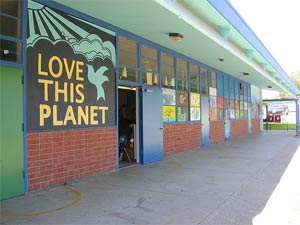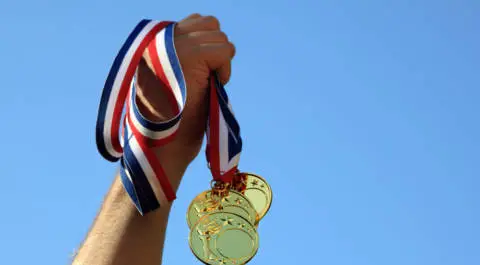Nestled into the community of Lawndale, CA, students trek their daily commute to ECHS. The sky is blue, the weather is cool, and the air is crisp. The school isn’t something you see in your everyday to say the least. In fact, the model it provides challenges more than just curriculum – it challenges the relationship between teachers and students, students and students, and, most importantly, students and the community.
Like Organic Soul on Facebook
The school nicely spells out what is does, and what values it hopes to instill in their students: “The mission of Environmental Charter High School is to inspire students to discover their own sense of purpose, to equip all students with the knowledge and skills to graduate from college, and to empower them to become quality stewards of their community and world.”
From a wood chip amphitheater built from sustainably grown wood and reclaimed urbanite stone, to several gardens circulated yearly to promote soil rich with nutrients, to vast student-painted murals representing the students and the school’s values, ECHS’s campus is like no other. To be frank, it seems more like a walk through a park or botanical garden than a campus. Even the fences are unique. Usually symbolic of a prison, constraining the students inside, ECHS allows grape vines and other plants to wrap around the cold steel, turning it into a living fence, not a barrier that asphyxiates individuality and hope.
Before the school moved in, the walls were white, much of the grounds were dirt or concert; needless to say, the feeling at the time was representative of the two: bland and in need of renovation. Once ECHS made its home there, however, creativity burst out in all directions. The school evolved year by year, representing something truly organic about the process that goes on there. Students in tandem with both faculty and each other began to transform the once bleak school grounds to something lively, unique, and by all account inspiring.
 Today, ECHS continues to offer a model, not just for other schools, but also for entire communities – and sustainability is the name of the game. For one, the school gathers water in collection tanks and uses it to irrigate their gardens. On top of that, they have over 60 fruit trees around campus that are tended to by faculty and students – each acting as all-natural vending machines. Throughout the campus, solar compost bins are available to toss in food waste, which will be used as organic compost for gardens. The students have even had a hand in building a solar boat, made from reclaimed materials, plastic bottles, and powered by the sun.
Today, ECHS continues to offer a model, not just for other schools, but also for entire communities – and sustainability is the name of the game. For one, the school gathers water in collection tanks and uses it to irrigate their gardens. On top of that, they have over 60 fruit trees around campus that are tended to by faculty and students – each acting as all-natural vending machines. Throughout the campus, solar compost bins are available to toss in food waste, which will be used as organic compost for gardens. The students have even had a hand in building a solar boat, made from reclaimed materials, plastic bottles, and powered by the sun.
When walking through the campus, observing the students, the buildings, and the scenery, I couldn't help but feel refreshed. As a student of political science who will soon depart to conduct research on unique methods in green education, I was more than inspired: I was truly taken aback by the community they had created. To make it even more unbelievable, they have achieved it at a high school level, something that – in California at least – is classically stereotyped as a time of rebellion, apathy, and disinterest in social problems.
Everything on campus is a “product of what students can do,” says Matt Dang, a senior at ECHS preparing to transfer into psychology or anthropology at the college level. Dang himself shows how much potential students can have if given the right chance; along with a local bike shop owner, he has helped educate his peers on the cost-effective and environmentally friendly nature of biking. To him, when it comes down to it, ECHS is more than an ordinary school – it is a community that not only supports its parts and encourages creativity, but also demands rigorous commitment.
For many students like Dang, that rigor pays off. Kyle Vincent, also a senior at ECHS (hoping to make it to Harvey Mudd for mechanical engineering), knows the value of the education he has acquired so far. “The most important thing I’ve learned is how to have voice and have power…I’ve gone from being someone who’s really shy to being one of the most social seniors on campus.” Vincent helped lead the mechanical committee at designing and operating his class’s soar boat.
Both Vincent and Dang also led the tour group around the grounds, rattling off facts about the sustainability of the school, the unique programs it offers, and the general sentim ent students have. All in all, these two helped make it more of a memorable day than if I was to just tour the grounds myself. “These are the leaders we need,” I thought to myself.
ent students have. All in all, these two helped make it more of a memorable day than if I was to just tour the grounds myself. “These are the leaders we need,” I thought to myself.
The good doesn't stop there, though. Organizations like Youth Policy Institute are helping ECHS is helping develop a new level of interconnectedness with the community, and the emphasis put on student innovation promises unique, inventive, and progressive ideas for sustainability and ecologically minded social policy.
Without a doubt, we’ll continue to see big things coming from ECHS, and even bigger things coming from their students.
















